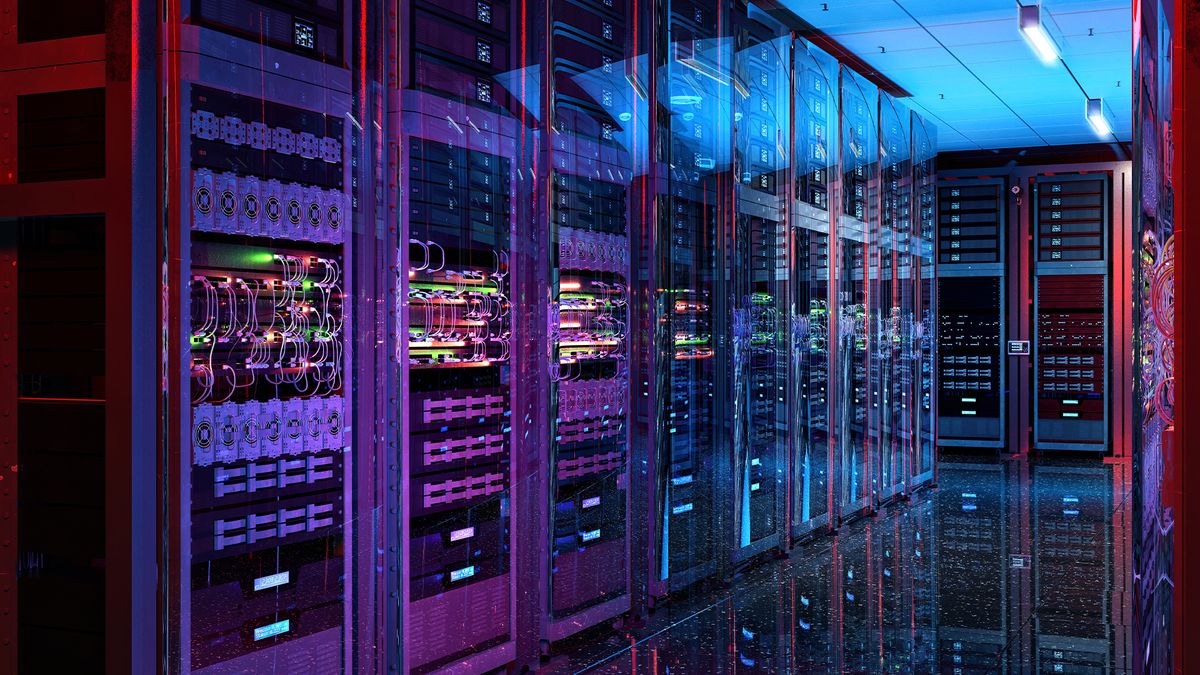The UK’s data center industry could grow tenfold by 2035, according to new analysis from techUK, but only if the government takes action on energy supply and planning reforms.
A new report from the trade body found data centers are already contributing £4.7 billion in Gross Value Added (GVA) annually to the UK economy, £640 million in tax revenue, and supporting 43,500 jobs across the UK economy.
If the UK can boost data center supply to more than its recent growth rate, which stands between 10-15% per year, this could bring in an extra £44 billion in GVA between 2025 and 2035 from the construction and operation of data centers, along with a tax boost of an additional £9.7 billion.
Employment opportunities could also surge, the study found, with 40,200 additional jobs directly employed in data center operational roles and an extra 18,200 additional jobs in data center construction roles.
“Data centers are the backbone of the digital economy; without them our transport, energy and wider economy couldn’t function. And with continued AI advances, the importance of data centers to unlocking tech-led growth is only accelerating,” said Matthew Evans, TechUK’s director for markets.
“Despite the critical role data centers play in supporting sustainable economic growth, their potential is far from fully realized. With the right policy support and collaboration between industry and government, the sector is poised to drive further innovation and enable digital transformation across all sectors of the economy across the country.”
Increased government support to drive infrastructural improvements will be required to meet these goals, however. The report noted that investment is needed to improve grid connections and enable access to renewable energy sources through schemes such as power purchase agreements (PPAs).
TechUK also called for the development of on-site renewable energy sources such as geothermal or small modular reactors (SMRs), to help ensure long-term sustainability.
The use of SMRs in data center operations has become a recurring talking point in recent months as power demands skyrocket. Oracle CTO and co-founder Larry Ellison revealed the company is exploring the possibility of embedding these smaller reactors within data centers to increase power capacity.
The UK’s planning system also needs reform, according to TechUK, with the trade group calling for the introduction of a National Policy Statement for data centers, streamlined planning processes through the Nationally Significant Infrastructure Projects (NSIP) regime, and improved training for local planning authorities to ensure consistent decision-making.
“This government has already begun to give a boost to the sector by giving them Critical National Infrastructure status which will strengthen protections against events like cyber attacks,” said technology secretary Peter Kyle.
“As these findings show, if government and industry work together to tackle the challenges and harness the opportunities the sector offers, we can create thousands of jobs and drive prosperity across all corners of the country. We have already seen the sector respond with over £25 billion of private investment committed in recent months.”
Data center growth could be stunted by energy constraints
The report from techUK comes as researchers warn that data center demands could exceed the world’s global renewable electricity supply by as early as next year.
A study from Loughborough University said growing data consumption rates globally could surpass the total volume of electricity production by 2033.
“Our research underlines the need for a data-centric sustainability approach across all supply chains, sectors, industries, and nations,” said Loughborough Business School academic Dr Vitor Castro.
“Such measures are crucial to increase efficiency, cut energy usage, and transition towards a decarbonized digital ecosystem, thereby supporting the global pursuit of a sustainable, net-zero future.
“This isn’t just a technical challenge; it’s a societal imperative. We must shift from consumption-driven growth to sustainable practices that align digital advancements with ecological limits.”
Data center power consumption has become a hot topic across the global tech sector, with industry stakeholders and researchers warning that the energy demands placed on infrastructure by generative AI and cloud services is becoming untenable.
A study earlier this year found data center operators in Europe are struggling to meet demands, while a host of major industry players – such as Microsoft and Google – have recorded surging greenhouse gas emissions as a result.
This has prompted some companies to explore alternative energy sources to contend with growing demands – and nuclear energy in particular has been earmarked as a key focus.
In September, Microsoft signed a 20-year power purchase agreement (PPA) with energy provider Constellation to power data centers with nuclear energy.
The partnership will utilize ‘Unit 1’ of the Three Mile Island site in Pennsylvania, where a partial nuclear meltdown in ‘Unit 2’ took place over 40 years ago.
Last month, Google announced a partnership with Kairos Energy that will see the firm use SMRs to power its data centers by the end of the decade. The agreement will see 500MW of power supplied to the tech giant, with the first of SMRs due to come online by 2030.
Source link
